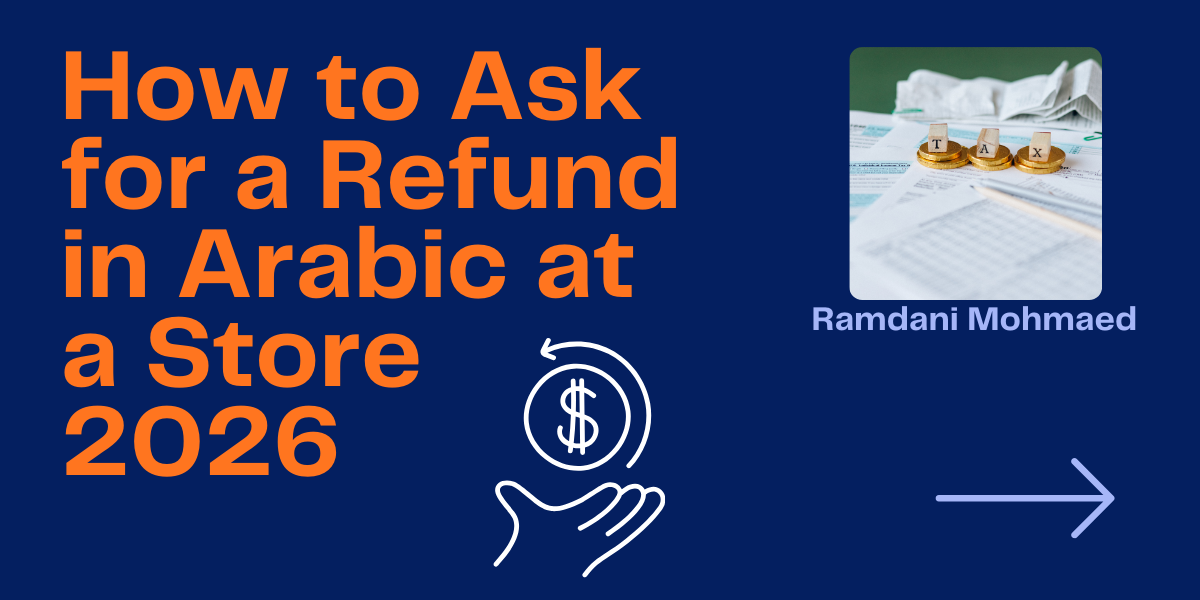Ask for a Refund in Arabic at a Store 2026
When you visit a store in an Arabic-speaking country, the experience can be exciting, but sometimes things do not go as planned. You may buy a product that turns out to be defective, does not meet your expectations, or is different from what was advertised. In these situations, knowing how to ask for a refund in Arabic is essential. Being able to communicate clearly not only helps you solve the problem but also ensures that you do so politely and respectfully. Understanding the right words and phrases can save time, avoid misunderstandings, and even prevent conflicts.
As a learner of Arabic, navigating these situations can feel intimidating. Unlike general conversation, asking for a refund often requires specific vocabulary, polite expressions, and an understanding of cultural norms. You need to know not only how to say “I want a refund” but also how to explain the reason for returning the product, how to negotiate if necessary, and how to respond if the store offers alternatives such as an exchange or store credit. Every step matters, and every word counts.
This article is designed to guide you through that process. We will cover practical phrases, examples of dialogues in stores, and tips for handling different types of refunds. Whether you are buying electronics, clothing, or groceries, you will gain tools that make your communication smoother and more confident. You will also learn subtle cultural nuances, such as the importance of politeness, tone, and body language when speaking with store staff. In many Arabic-speaking countries, showing respect in your interaction increases the likelihood of a positive outcome.
Beyond just phrases, this guide aims to improve your overall Arabic communication skills. By practicing these refund scenarios, you will expand your vocabulary, improve your sentence structure, and become more comfortable with real-life conversations. This is not just about returning a product—it is about using Arabic in practical, everyday situations. Every phrase you learn here is a step toward fluency, helping you navigate markets, stores, and other interactions confidently.
At Ramdani Arabic Academy, we believe that learning a language should be practical and engaging. This article is part of our mission to help Arabic learners apply their skills in real-world situations. By the end of this guide, you will not only know how to ask for a refund in Arabic but also feel more comfortable interacting with native speakers in a variety of settings.
Whether you are a beginner or an intermediate learner, the following sections will provide detailed, step-by-step guidance. You will find examples, explanations, and advice to make every interaction in a store smooth and respectful. Learning to ask for a refund correctly is a small but significant step toward mastering Arabic and gaining confidence in everyday communication.

Common Arabic Phrases for Asking a Refund
When you are in a store and need to ask for a refund, knowing the right phrases is crucial. Using the correct words helps you communicate your request clearly and politely. Here are some of the most common phrases you can use:
1. Asking directly for a refund
- Arabic: أريد استرداد النقود من فضلك
- Transliteration: Urid istirdad al-nuqud min fadlik
- English: I want a refund, please
This is the simplest and most direct way to ask. Using “من فضلك” (min fadlik) adds politeness, which is important in Arabic-speaking cultures.
2. Explaining the reason for the return
- Arabic: المنتج معيب / لا يعمل بشكل صحيح
- Transliteration: Al-muntaj ma‘ib / la ya‘mal bishakl sahih
- English: The product is defective / does not work properly
- Arabic: هذا ليس ما طلبته
- Transliteration: Hatha laysa ma talabtuh
- English: This is not what I ordered
Giving a clear reason makes it easier for the staff to process your request. Be concise and specific without sounding confrontational.
3. Asking if a refund is possible
- Arabic: هل يمكنني استرداد النقود؟
- Transliteration: Hal yumkinuni istirdad al-nuqud?
- English: Can I get a refund?
- Arabic: هل يمكن إرجاع هذا المنتج؟
- Transliteration: Hal yumkin irja‘u hatha al-muntaj?
- English: Can I return this product?
These phrases are polite ways to confirm if a refund or return is allowed.
4. Responding if the store offers alternatives
Sometimes, a store may offer an exchange or store credit instead of a cash refund. You can respond with:
- Arabic: أريد استرداد النقود بدلاً من التبادل
- Transliteration: Urid istirdad al-nuqud badlan min al-tabadul
- English: I want a refund instead of an exchange
- Arabic: شكراً، لكن أريد المال نقداً
- Transliteration: Shukran, lakin urid al-mal naqdاً
- English: Thank you, but I want cash
These phrases help you assert your preference politely.
Tips for using these phrases
- Speak clearly and slowly.
- Use polite words like “من فضلك” (please) and “شكراً” (thank you).
- Keep a calm tone, even if you are frustrated.
Learning these basic phrases prepares you for most refund situations. Practicing them out loud before visiting a store will make your interaction smoother.

Sample Dialogues for Asking a Refund
Seeing the phrases in action helps you understand how to structure your conversation. Here are common scenarios you may encounter in stores.
1. Returning a defective product
Customer: مرحباً، أريد استرداد النقود من فضلك.
Transliteration: Marhaban, urid istirdad al-nuqud min fadlik
English: Hello, I want a refund, please.
Store Staff: هل هناك مشكلة بالمنتج؟
Transliteration: Hal hunak mushkila bil-muntaj?
English: Is there a problem with the product?
Customer: نعم، المنتج معيب ولا يعمل بشكل صحيح.
Transliteration: Na‘am, al-muntaj ma‘ib wa la ya‘mal bishakl sahih
English: Yes, the product is defective and does not work properly.
Store Staff: حسناً، يمكننا استرداد النقود.
Transliteration: Hasanan, yumkinuna istirdad al-nuqud
English: Okay, we can process the refund.
2. Returning the wrong item
Customer: مرحباً، أريد استرداد النقود من فضلك.
Transliteration: Marhaban, urid istirdad al-nuqud min fadlik
English: Hello, I want a refund, please.
Store Staff: هل تريد التبادل؟
Transliteration: Hal turid al-tabadul?
English: Do you want an exchange?
Customer: شكراً، لكن هذا ليس ما طلبته وأريد المال نقداً.
Transliteration: Shukran, lakin hatha laysa ma talabtuh wa urid al-mal naqdan
English: Thank you, but this is not what I ordered and I want cash.
Store Staff: حسناً، سيتم استرداد النقود فوراً.
Transliteration: Hasanan, sayutamm istirdad al-nuqud fawran
English: Okay, the refund will be processed immediately.
3. Asking if a refund is possible
Customer: هل يمكنني استرداد النقود؟
Transliteration: Hal yumkinuni istirdad al-nuqud?
English: Can I get a refund?
Store Staff: هل يوجد سبب للاسترداد؟
Transliteration: Hal yujad sabab lil-istirdad?
English: Is there a reason for the refund?
Customer: المنتج لا يعمل كما هو موصوف، أريد استرداد النقود من فضلك.
Transliteration: Al-muntaj la ya‘mal kama huwa mawsuf, urid istirdad al-nuqud min fadlik
English: The product does not work as described, I want a refund, please.
Store Staff: لا مشكلة، سيتم معالجة الاسترداد الآن.
Transliteration: La mushkila, sayutamm mu‘alajat al-istirdad al-aan
English: No problem, the refund will be processed now.
These dialogues cover common situations: defective items, wrong orders, and checking if a refund is possible. Practicing these examples will help you speak confidently and handle real interactions.

Polite Strategies and Cultural Tips for Asking for a Refund
In Arabic-speaking countries, how you speak is often as important as what you say. Politeness, tone, and body language can influence whether your refund request is successful. Here are some practical strategies:
1. Always start politely
- Begin your request with greetings like “مرحبا” (Marhaban – Hello) or “السلام عليكم” (As-salamu alaykum – Peace be upon you).
- Use “من فضلك” (min fadlik – please) when asking for a refund.
Starting politely sets a respectful tone and increases the chance of a positive response.
2. Explain your reason clearly
- Clearly state why you want a refund. Use short, factual sentences.
- Examples:
- “المنتج معيب” (Al-muntaj ma‘ib – The product is defective)
- “هذا ليس ما طلبته” (Hatha laysa ma talabtuh – This is not what I ordered)
Being concise avoids confusion and demonstrates that your request is reasonable.
3. Keep your tone calm
- Even if you are frustrated, avoid raising your voice or showing anger.
- A calm tone communicates that you are respectful and serious, making the staff more willing to help.
4. Be flexible when appropriate
- Some stores may offer exchanges or store credit instead of cash.
- Consider your options, but clearly express your preference politely if you want a refund.
5. Use gestures and body language
- Smile slightly and maintain eye contact without staring.
- Hand gestures should be natural, not aggressive.
These small details are noticed and appreciated in Arabic-speaking cultures.
6. Know store policies beforehand
- Many stores have specific rules about refunds, especially for electronics, clothing, or perishable goods.
- Ask about the policy before purchasing to avoid surprises later.
7. Practice the phrases
- Rehearse your request out loud. This helps with pronunciation, confidence, and flow.
- Even simple repetition can make you feel more comfortable in a real situation.
Following these strategies increases your chances of a smooth, respectful, and successful refund process. They also help you practice Arabic in practical, everyday situations, which is an essential part of language learning.
At Ramdani Arabic Academy, we emphasize learning Arabic that you can actually use in real life. Knowing the right words is only part of the skill—you also need to know how to interact respectfully and confidently. These strategies prepare you not just to get a refund but to communicate effectively in stores, markets, and other public spaces.
Final words
Asking for a refund in an Arabic-speaking store can feel challenging, but with the right words, tone, and approach, it becomes straightforward. The key is to be polite, clear, and confident. Start with greetings, explain your reason concisely, and maintain a calm tone throughout the conversation. Knowing simple phrases, practicing dialogues, and understanding cultural norms makes the process smoother and increases the likelihood of a positive outcome.
Remember, a refund request is not just about getting your money back—it is an opportunity to practice real-life Arabic. Every interaction helps you improve vocabulary, sentence structure, and conversational skills. By applying these strategies, you not only solve a problem but also build confidence in speaking Arabic in everyday situations.
At Ramdani Arabic Academy, we focus on teaching Arabic that learners can use immediately. Our courses, lessons, and articles are designed to help you navigate real-life situations, from stores and markets to professional and social settings. Practicing these refund scenarios is just one way to strengthen your skills and feel more comfortable using Arabic daily.
This guide was created by Ramdani Mohamed, founder of Ramdani Arabic Academy, with the goal of helping learners worldwide use Arabic confidently. By following these tips and practicing consistently, you can handle refunds, returns, and other daily interactions with ease, while continuing to improve your language skills.
Learning Arabic is a process, and applying it in practical situations is the fastest way to progress. Start small, practice regularly, and don’t be afraid to use what you’ve learned. Every step, even asking for a refund, is a step toward fluency.







